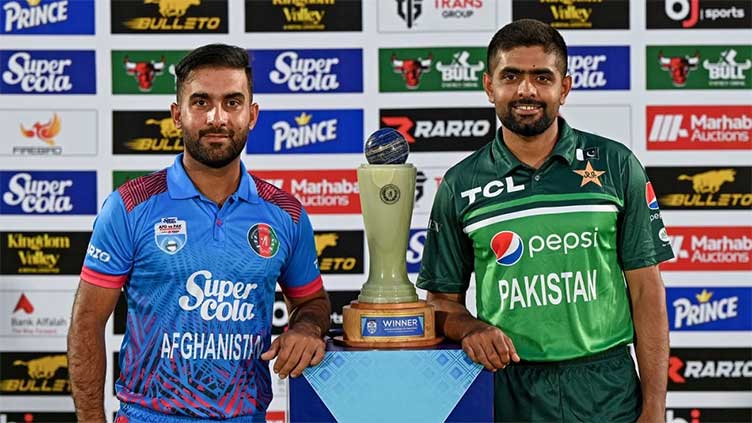Pakistan look to shake off ODI rust against Afghanistan

Cricket
Pakistan will face Afghanistan in the first ODI of the three-match series today (Tuesday).
HAMBANTOTA (Web Desk) - The clock would not even have struck nine in the morning when PCB chairman Zaka Ashraf was in his car in Colombo. It is rush hour in Colombo on a Monday morning, no one's idea of a pleasant start to any day.
But this VIP guest could not leave it any longer, because the appointment he had to keep lay four hours away in a small southern Sri Lankan town. Ashraf was meeting the Pakistan team for brunch in Hambantota, a day out from the start of the first of three ODIs between Pakistan and Afghanistan.
With no flights between the capital and the town, this was the only way to get there. Ironically, if Afghanistan -- the official hosts of the series -- had been actually hosting it -- Kabul was just a half-hour plane hop away.
The window in any four-year cycle when bilateral ODI cricket truly feels like it matters has shrunk exponentially and is diminishing even faster, but we're finally looking through it now.
With the ODI World Cup on the horizon, Afghanistan and Pakistan - victims of geopolitics and security concerns - find themselves in Sri Lanka for the best part of their preparations for the tournament.
Before the Asia Cup, they have got together for their first-ever bilateral series, Hambantota and Colombo the neutral venues.
It is not clear if the Afghanistan players also had the pleasure of the ACB chairman to benefit from, but they got to Hambantota early enough.
Hashmatullah Shahidi's side has experience at the venue; just two months earlier, they played a three-match ODI series against Sri Lanka in Hambantota, losing 2-1.
They played a more recent 50-over series in Bangladesh, winning it by the same margin. It's a near-identical squad to those two tours that they have assembled in Hambantota to face Pakistan. It's a settled side, and one that's had ODI experience in these conditions. It's more than Pakistan can say.
Afghanistan might never have beaten Pakistan in this format, but they have little to fear.
The four times these sides have played ODIs - at varying degrees of development during Afghanistan's journey over the last decade - Afghanistan have shown steady improvement, and been desperately unlucky not to win their last two encounters.
Throw in Naseem Shah's T20 Asia Cup heroics, and Afghanistan's problem against Pakistan boils down less to quality and more to composure and experience in the moments that count most. As the 2-1 T20I series defeat of Pakistan in March demonstrated, they are making progress on that front, too.
Pakistan have played only a few more ODIs than their counterparts this World Cup cycle - it is their lowest tally since 1979-83 - and any patterns of form are difficult to make out. Their only ODI involvement all year has come in the form of eight matches against New Zealand at home, for all of which the visitors were hindered by unavailability to some extent or other.
That has been the story of Pakistan's opponents for much of the last four years; series wins against South Africa and Australia have come when those teams have been significantly diminished. Nine further games have been played against Zimbabwe, the Netherlands and the West Indies. But the win-loss ratio -19 victories and eight defeats - is solid, and in May, they rose to the top of the ODI rankings; they will get there again if they beat Afghanistan 3-0.
At its core, Pakistan in ODIs are surprisingly uncomplicated - a world-class top three, a gun pace bowling attack, and the still ascending star of Shadab Khan. That's about it. The middle order is unconvincing, the underbelly is weak, and bench strength, particularly in the batting department, is limited. It's a Polo-shaped side, a winning formula all around with a large gap through the middle. That makes it conspicuously incomplete, but also plenty of fun.
Pakistan have, belatedly in this cycle, tried to plug those gaps.
Agha Salman has shown flashes of ability in the middle order, while Mohammad Nawaz has gradually assumed greater importance in the ODI side. Tayyab Tahir and Abdullah Shafique offer bench strength, while Pakistan wait for Mohammad Rizwan to translate his T20 runs into ODI accumulation. While what they have might be enough to overwhelm Afghanistan, this series is as much about what follows as it is about itself, and Pakistan will try and ensure they don't spread themselves too thin for the sterner tests that will follow.
By the time Ashraf returned to Colombo, the evening rush hour was waiting to greet him. It was quite a day for the chairman, but for the players he left behind in Hambantota, the long hard grind of the season was only just about to begin.

